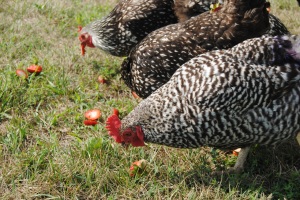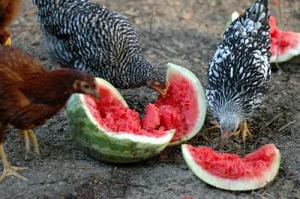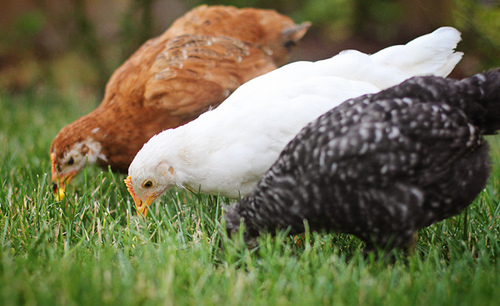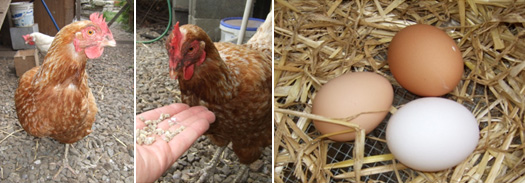Commercial Feeds
Medicated on non-medicated?
Medicated feed is a preventative measure against coccidiosis infection in young chicks. Coccidiosis is passed between birds via feces. Keeping chicks in clean, dry litter or on a wire mesh floor is effective at limiting exposure to feces and may be sufficient in preventing coccidiosis. Medicated feeds have been developed primarily because in commercial operations, limiting chick exposure to feces is nearly impossible. When getting your birds, it is important to enquire if they have already been vaccinated against Coccidiosis.
Chick Starter
This feed is designed to meet the nutritional requirements of hens from hatching to approximately 6 weeks of age. It contains 20 to 25% protein, which allows for initial quick and optimal development.
Grower / Pullet
This feed is designed to meet the nutritional requirements of hens from approximately 6 to 22 weeks of age (or to the laying of their first egg). It contains 16-18% protein; this lower protein quantity actually slows development and allows hens, destined to be layers, to grow strong bones and reach adult body weight before laying begins.
Layer feed
This feed is designed to meet the nutritional requirements of hens from approximately 22 weeks of age (or the laying of their first egg) onwards. It contains 16-18% protein with the addition of calcium, phosphorus and other minerals, to aid with egg development.
Feed Consistency
Feed comes in 3 consistencies: mash, crumble and pellets. Mash is a fine flake or power, which may be fed dry or mixed with water to create a moist mash; this if often fed to chicks. Adult feed comes in crumbles or pellets, although crumbles are preferred if they are available.
Garden Forage
Chickens will happily eat your garden weeds and common garden pests such as slugs, grubs and bugs. Be aware however, that they may not stop at your weeds; they also love fresh seedlings and a variety of ornamental garden plants. Chickens may also eat plants that are toxic to chickens. Chickens should be sequestered from newly seeded areas, plants you do not want damaged, as well as toxic plants. We recommend that you read up on what common garden plants are toxic to chickens. PoultryHelp.com offers this great resource list of toxic plants.
Kitchen Scraps

You may supplement your chickens’ diet with cooked or raw leftovers from the kitchen. You may feed them items that are bruised or overripe, but do not feed them anything that is so rotten you wouldn’t eat it yourself. Do not feed them candies or sweets, anything high in salt, citrus, raw or green potato, avocado peel or pits, raw eggs, dried or uncooked beans. Backyard chickens provides a wonderful chart of produce and food scraps that can be fed to chickens.
Treats

Just like the offerings from your favorite bakery, treats are yummy but do not contain balanced nutrition and should remain treats not regular diet items!
Chicken Scratch
This is a treat made of a mixture of various grains such as wheat, rye, corn.
Earth Worms, Meal Worms and Crickets
These are available live or freeze dried at many pet or bait and tackle shops. Live critters provide chick
ens with enrichment and the opportunity to hone hunting skill. They also provide a great deal of entertainment for you!
Other Nutritional Requirements
Grit
Chickens do not have teeth, and therefore need to consume sand, small stones and grit to aid with the grinding of consumed food within the digestive system. If you are feeding your chickens whole grains, scratch or food scraps, you must also provide access to some form of grit.
Oyster or Egg Shell
In order to lay eggs with strong and well formed shells chickens require a diet that is high in calcium and other minerals. You must provide your chickens with a calcium rich dietary supplement such as oyster shell. Their own egg shells are also an excellent calcium supplement, however special care must be given if you intend to feed them to your chickens. If chickens recognize they are eating egg, they may develop the habit of pecking, eating and destroying their eggs before you have a chance to collect them. To ensure they do not resemble eggs, egg shells should be washed, dried and ground down to fine chips or powder before being fed to chickens.










